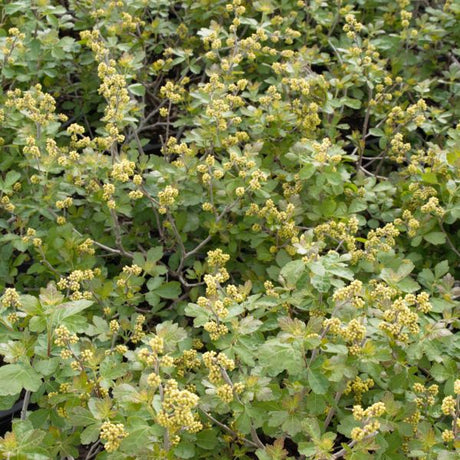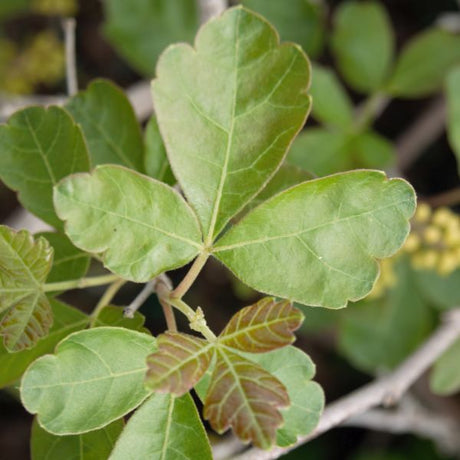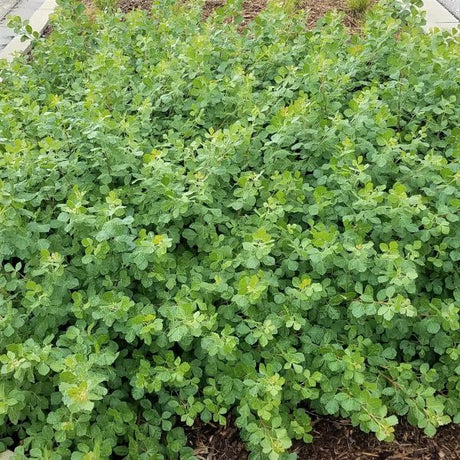-
6% off
Rhus aromatica 'Gro-Low'
Sale price $6917 Regular price $7358Unit price /Unavailable -
Tiger Eyes® Cutleaf Staghorn Sumac
Rhus typhina 'Bailtiger' PP16185
Regular price $9134Unit price /Unavailable -
Sold outUp to 11% off
-
Sold out
-
Sold out
Find Sumac Shrubs at Nature Hills Nursery
Sumac Shrubs bring vibrant color, bold texture, and year-round reliability to any landscape. These hardy native Rhus species light up sunny spaces with their tropical-looking foliage, bright fruit clusters, and fiery fall color. With more than 200 species in the Rhus family, Sumac Shrubs deliver dependable performance from spring through winter, giving gardeners of all experience levels something to cheer about.

Nature Hills offers several ornamental Sumac varieties that show off graceful forms, dramatic leaves, colorful berries, and outstanding wildlife value. These shrubs are tough as nails, beautifully unique, and ready to shine in almost any landscape setting.
All About Sumac
Sumac Shrubs, sometimes spelled Sumach, belong to the Rhus family, which includes both evergreen and deciduous species. The varieties offered at Nature Hills are not the same as Poison Sumac. Instead, these ornamental shrubs are garden-friendly, pollinator-friendly, and landscape-ready.
In spring, beneficial insects flock to their nectar-rich flower clusters that appear at branch tips. Bees, beetles, and wasps all visit these creamy white and greenish-yellow blooms. Some types, such as Fragrant Sumac, even serve as important caterpillar host plants for dozens of Lepidoptera species. Learn more about supporting these important garden helpers with this guide to host plants.

Many Sumac Shrubs are dioecious, meaning male and female flowers appear on separate plants. Only the female shrubs produce the upright clusters of fuzzy red fruit that persist through the winter. These berries offer valuable food for pheasants, quail, wild turkeys, and hundreds of songbird species.
People have used these fruits for centuries, too, brewing them into a refreshing lemonade-like drink called Sumac-ade or drying and grinding them into a lemony spice used in Middle Eastern cuisine. If you enjoy using garden plants for flavoring drinks or tea, check out this helpful resource on plants that flavor drinks.
The fuzzy new growth is one of the plant’s signature features, inspiring the name STAGHORN SUMAC due to its antler-like velvet-covered branches. Most Rhus species feature long pinnately compound leaves, while Fragrant Sumac and its close cousins show off aromatic tri-lobed foliage that releases a warm scent when crushed.

Landscape Value of Sumac Shrubs and Trees
Sumac Shrubs thrive in tough locations where many plants simply fail. They tolerate poor soils, urban pollution, roadside conditions, steep slopes, and wind. Cold-hardy from USDA zones 3 to 9, Sumacs take heat, drought, rocky ground, and thin soil in stride.
Their flexible structure allows gardeners to enjoy them as open shrubs, naturalized colonies, or even as small trees with pruning. Their airy branching and feathered leaves create shelter for birds, while the fruit clusters provide crucial winter forage.
These native shrubs are an ideal choice for low-maintenance landscaping that still delivers beauty and seasonal interest.
- Groundcover in wide open areas
- Suckering native plants for erosion control on slopes. For more options, see this guide on erosion control
- Perfect for mass planting and naturalized thickets
- Great for rock gardens, hell strips, and commercial sites
- Handles poor soil and drought once established. Explore more drought-tolerant plants
- Easy to prune into multi-trunk tree forms. Learn about multi-stemmed trees
- Wildlife, bird, and pollinator friendly. Discover more bird-friendly plants
- Tolerates pollution and urban settings. Explore top pollution-tolerant shrubs
- Cold-hardy option for privacy hedges and screening
The shallow root system encourages suckering, allowing you to build full colonies or keep plants contained with light pruning. Even deer usually pass them by unless food is extremely scarce.

Caring for Sumac Shrubs
These shrubs are some of the easiest native plants you can grow. They prefer full sun, though some varieties tolerate partial shade. Well-drained soil is ideal, but Sumac happily handles poor, rocky, or slightly acidic soil. Learn more about why soil drainage matters with this quick guide to well-drained soil.
Once established, Sumac is drought-tolerant and requires very little maintenance. Prune in late winter or early spring if you want to shape or size the plant. They also respond well to rejuvenation pruning, where stems are cut back during dormancy. Renewal pruning every few years keeps the stand healthy and vigorous. Trim or mow off suckers if you do not want them to spread.
Stunning Sumac Shrubs
From fiery fall color to wildlife-friendly fruit clusters and bold tropical foliage, Sumac Shrubs bring unforgettable beauty and personality to the landscape. Order fresh, healthy Sumac Shrubs for your next project at NatureHills.com and let these hardy natives become the stars of your outdoor space.
Find your growing zone anytime using the USDA Zones guide.
Bring home the dependable beauty of Sumac Shrubs from Nature Hills Nursery today. Family-owned and operated since 2001, Nature Hills Nursery offers an ever-growing collection of quality plants backed by our product guarantee. We carefully follow all plant shipping regulations to protect local ecosystems, and you can always learn more using our online Planting Guide.
FAQ's for Buying Sumac Online
What are Sumac shrubs and how are they used in landscaping?
What are Sumac shrubs and how are they used in landscaping?
Sumac shrubs (Rhus) are hardy, low-maintenance native plants known for their tropical-looking foliage, vibrant fall color, and wildlife value. Used in landscaping for groundcover, erosion control, privacy screens, and ornamental accents, Sumac is ideal for poor soils, rocky terrain, and slopes where other plants struggle.
Is Sumac deer-resistant and pollinator-friendly?
Is Sumac deer-resistant and pollinator-friendly?
Yes, Sumac shrubs are deer-tolerant thanks to their textured bark and fuzzy branches, and they’re highly attractive to pollinators. Their nectar-rich flowers support bees, wasps, and butterflies, while the fruit clusters provide essential winter food for birds like pheasants, quail, and over 300 songbird species.
Can Sumac shrubs grow in poor soil or urban environments?
Can Sumac shrubs grow in poor soil or urban environments?
Absolutely. Sumac thrives in poor, rocky, and dry soils and is highly tolerant of urban pollution. These shrubs handle full sun or partial shade and adapt well to roadside plantings, commercial sites, and other challenging conditions where low-maintenance, resilient plants are needed.
Are any Sumac plants edible or useful in the kitchen?
Are any Sumac plants edible or useful in the kitchen?
Yes! While the Sumacs sold by Nature Hills are not poisonous, some varieties offer edible fruit used to make Sumac-ade, a tangy, lemonade-like drink. Dried and ground Sumac is also used as a spice in Middle Eastern cooking, adding a citrusy flavor to salads and meat dishes.
How do you care for Sumac shrubs for best growth?
How do you care for Sumac shrubs for best growth?
Plant Sumac shrubs in well-drained soil with full sun for best color and form. Prune in late winter to maintain shape, or perform renewal pruning every few years. They’re drought-tolerant once established and require minimal maintenance, though suckers can be trimmed annually if not desired.























